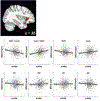Polygenic risk for neuroticism moderates response to gains and losses in amygdala and caudate: Evidence from a clinical cohort
- PMID: 34186230
- PMCID: PMC8411869
- DOI: 10.1016/j.jad.2021.06.016
Polygenic risk for neuroticism moderates response to gains and losses in amygdala and caudate: Evidence from a clinical cohort
Abstract
Background: Neuroticism is a heritable trait that contributes to the vulnerability to depression. We used polygenic risk scores (PRS) to examine genetic vulnerability to neuroticism and its associations with reward/punishment processing in a clinical sample with mood, anxiety, and substance use disorders. It was hypothesized that higher PRS for neuroticism is associated with attenuated neural responses to reward/punishment.
Method: Four hundred sixty-nine participants were genotyped and their PRSs for neuroticism were computed. Associations between PRS for neuroticism and anticipatory processing of monetary incentives were examined using functional magnetic resonance imaging.
Results: Individuals with higher PRS for neuroticism showed less anticipatory activation in the left amygdala and caudate region to incentives regardless of incentive valence. Further, these individuals exhibited altered sensitivity to gain/loss processing in the right anterior insula. Higher PRSs for neuroticism were also associated with reduced processing of gains in the precuneus.
Limitations: The study population consisted of a transdiagnostic sample with dysfunctions in positive and negative valence processing. PRS for neuroticism may be correlated with current clinical symptoms due to the vulnerability to psychiatric disorders.
Conclusions: Greater genetic loading for neuroticism was associated with attenuated anticipatory responsiveness in reward/punishment processing with altered sensitivity to valences. Thus, a higher genetic risk for neuroticism may limit the degree to which positive and/or negative outcomes influence the current mood state, which may contribute to the development of positive and negative affective dysfunctions in individuals with mood, anxiety, and addictive disorders.
Keywords: Genetics; Neuroticism; Polygenic risk score; Reward; Sensitivity; fMRI, PRS.
Copyright © 2021 Elsevier B.V. All rights reserved.
Figures




References
-
- Amare AT, Schubert O, Tekola-Ayele F, Hsu Y, Sangkuhl K, Jenkins G, … Baune BT 2018. Association of the polygenic scores for personality traits and response to selective serotonin reuptake inhibitors in patients with major depressive disorder. Front. Psychiatry, 9, 65. 10.3389/fpsyt.2018.00065 - DOI - PMC - PubMed

